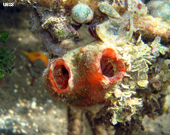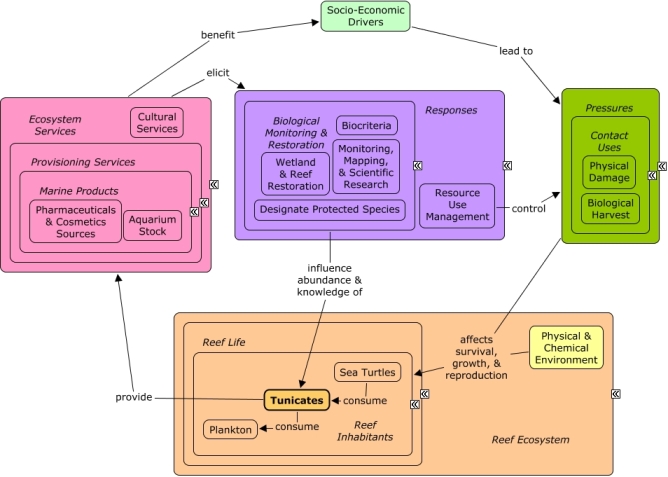ReefLink Database

Tunicates
Tunicates, or "sea squirts," are marine filter-feeding animals.
CMap

CMap Description
Tunicates contribute to the aquarium stock and pharmaceutical & cosmetics products as well as all cultural ecosystem services. Tunicates actively filter plankton from the surrounding water and act as a trophic link, since they are consumed by other reef inhabitants., Biological harvesting and biological addition, caused by socio-economic drivers, as well as a disturbed physical & chemical environment can affect the survival, growth, & reproduction of tunicates. Persistence of the complex coral reef ecosystem and sustainability of the services it provides requires identifying changes in the abundance and condition of the reef habitat though biological monitoring & restoration.Citations
More than 50 citations. Click here to load.
| Citation | Year | Study Location | Study Type | Database Topics |
|---|
Management Options
| Management Option | Description | Sources | Database Topics |
|---|---|---|---|
| Monitor & Research: Biological Status and Trends Monitoring | This activity produces long-term comprehensive information on sanctuary-wide status and trends of biological resources. Data that could be collected on coral reef communities includes but is not limited to species abundance and density, biodiversity, benthic cover, coral condition, growth, recruitment, predation, and grazing. Mangroves and seagrasses should also be monitored. With adequate baseline data, changes in community structure and biocriteria can be identified and restoration or protection efforts can be taken. | NOAA Marine Sanctuary Program. 2007. Florida Keys National Marine Sanctuary revised management plan. National Ocean Service, Key West, FL. |
Algae; Anemones & Zooanthids; Apex Fish Predators; Aquaculture; Aquarium Stock; Biochemical & Genetic Resources; Biocriteria; Biological Harvest; Biological Monitoring & Restoration; Biological Monitoring, Mapping, & Scientific Research; Bivalves; Calcareous Macroalgae; Contact Uses; Coral; Coralline Algae; Cyanobacteria; Decision Support; Echinoderms; Ecosystem Monitoring & Restoration; Finfish & Shellfish Stock; Fish; Fishing Sector; Food & Energy Policies; Hydrocoral; Invasive Species; Invertebrates; Large Herbivorous Fish; Lobster, Crab, & Shrimp; Mangroves; Marine Birds; Marine Products; Marine Vertebrates; Marine Worms; Microorganisms; Molluscs; Octocoral; Octopus & Squid; Ornamental Jewelry & Art; Pathogens; Pharmaceuticals & Cosmetics Sources; Physical Damage; Primary Production; Provisioning Services; Resource Use Management; Sea Turtles; Sea Urchins; Seagrasses; Seastars; Skeletal Coral; Small Herbivorous Fish; Snails & Conch; Sponges; Stony Coral; Tunicates; Wetlands; Whales & Dolphins |
Laws
| Legal Citation | Purpose of Law | Management Organization | Database Topics |
|---|
